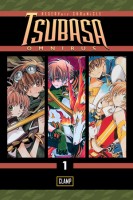My News and Reviews
A small variety of posts went up at Experiments in Manga last week. First up, the Cinderalla manga giveaway winner was announced. The contest was a tie-in to the Female Goth Mangaka Carnival, so the post also includes a list of the featured creators’ manga available in English. The first in-depth manga review for February was Saki Nakagawa’s Attack on Titan: Junior High, a parody spinoff of the immensely popular Attack on Titan franchise. The series’ funniness can be somewhat uneven, but it can be absolutely hilarious at times. And posted over the weekend was January’s Bookshelf Overload, revealing the absurd amount of manga that came into my household last month.
Elsewhere online, Viz Media’s Shojo Beat announced two new licenses: QQ Sweeper by Kyousuke Motomi (the creator of Dengeki Daisy, which I rather enjoy) and Idol Dreams by Arina Tanemura. Organization Anti-Social Geniuses posted The Very Unofficial Guide to Discovering Manga in 2015, which is a nice overview of demographics, publishers, where to read and buy manga, and so on. Den of Geek has an interview with comics historian Graham Kolbeins, one of the editors behind Massive: Gay Erotic Manga and the Men Who Make It and The Passion of Gengoroh Tagame: The Master of Gay Erotic Manga. Finally, Otaku USA interviews Patrick Macias about Hypersonic Music Club, his collaboration with artist Hiroyuki Takahashi and the first of Crunchyroll Manga’s original series.
Quick Takes
 Sky Link by Shiro Yamada. Like many boys’ love mangaka, before making her professional debut Yamada started by creating doujinshi (she seems to have been particularly fond of pairing Gintoki and Hijikata from Gin Tama together). Sky Link is Yamada’s first original manga and is currently the only work of hers available in English. The volume collects two unrelated boys’ love stories, the titular “Sky Link” and “You through a Kaleidoscope.” Unfortunately, neither of the short manga are particularly satisfying; while her artwork can at times be quite lovely (occasionally her characters’ eyes are unintentionally creepy), Yamada definitely has room to grow as a storyteller. “Sky Link” had too many disparate elements to it. It could have worked quite well as a longer series, but as a short story Yamada didn’t have enough time to effectively develop the plot or characters and everything is left frustratingly vague. Ritsuki is a first year college student with some sort of troubled past who has caught the attention and affections of one of his new professors who, it is later revealed, has a troubled past of his own. “You through a Kaleidoscope,” a fairly standard high school boys’ love romance, isn’t as ambitious but is more successful as a result.
Sky Link by Shiro Yamada. Like many boys’ love mangaka, before making her professional debut Yamada started by creating doujinshi (she seems to have been particularly fond of pairing Gintoki and Hijikata from Gin Tama together). Sky Link is Yamada’s first original manga and is currently the only work of hers available in English. The volume collects two unrelated boys’ love stories, the titular “Sky Link” and “You through a Kaleidoscope.” Unfortunately, neither of the short manga are particularly satisfying; while her artwork can at times be quite lovely (occasionally her characters’ eyes are unintentionally creepy), Yamada definitely has room to grow as a storyteller. “Sky Link” had too many disparate elements to it. It could have worked quite well as a longer series, but as a short story Yamada didn’t have enough time to effectively develop the plot or characters and everything is left frustratingly vague. Ritsuki is a first year college student with some sort of troubled past who has caught the attention and affections of one of his new professors who, it is later revealed, has a troubled past of his own. “You through a Kaleidoscope,” a fairly standard high school boys’ love romance, isn’t as ambitious but is more successful as a result.
 Tsubasa: Reservoir Chronicle, Omnibuses 1-2 (equivalent to Volumes 1-6) by CLAMP. I originally read the first few volumes of Tsubasa back when it was being released by Del Rey. Because I was borrowing it from the library and people had a tendency to steal volumes Tsubasa and its sort-of crossover series xxxHolic, I never got very far with the series. I’m glad that Kodansha is bringing Tsubasa back into print, because it really is an immensely enjoyable adventure tale. And because the setting is constantly moving from one dimension to the next, CLAMP is able to have a lot of fun with the clothing designs and worldbuilding from one short story arc to the next. The drive of the series is the search for Princess Sakura’s memory, pieces of which have been scattered throughout space and time, but the remembrances of her and the other characters form an important part of the story as well. I do think I’m enjoying Tsubasa a little more my second time trying to read it. I’ve now been exposed to more of CLAMP’s work, so I can better appreciate the references being made and the alternate-dimension versions of characters from the group’s other manga. (Seeing couples originally from X actually have a chance at happiness is both touching and heart-wrenching.)
Tsubasa: Reservoir Chronicle, Omnibuses 1-2 (equivalent to Volumes 1-6) by CLAMP. I originally read the first few volumes of Tsubasa back when it was being released by Del Rey. Because I was borrowing it from the library and people had a tendency to steal volumes Tsubasa and its sort-of crossover series xxxHolic, I never got very far with the series. I’m glad that Kodansha is bringing Tsubasa back into print, because it really is an immensely enjoyable adventure tale. And because the setting is constantly moving from one dimension to the next, CLAMP is able to have a lot of fun with the clothing designs and worldbuilding from one short story arc to the next. The drive of the series is the search for Princess Sakura’s memory, pieces of which have been scattered throughout space and time, but the remembrances of her and the other characters form an important part of the story as well. I do think I’m enjoying Tsubasa a little more my second time trying to read it. I’ve now been exposed to more of CLAMP’s work, so I can better appreciate the references being made and the alternate-dimension versions of characters from the group’s other manga. (Seeing couples originally from X actually have a chance at happiness is both touching and heart-wrenching.)
 UQ Holder!, Volume 3 by Ken Akamatsu. I enjoyed the third volume of UQ Holder more than I did the first two, but the series has yet to win me over. It seems as though the manga is starting to focus a bit more, which it desperately needed to do, but that may simply be because Akamatsu spends very little time on trying to develop a coherent plot and primarily sticks with the action sequences. The third volume is almost entirely devoted to a sequence of fight scenes. Right now the battles in UQ Holder are probably my favorite thing about the series. They are entertaining, exciting, and extremely energetic. And because immortals are involved, they can be pretty epic, too. The damage inflicted on both persons and property is impressive. Many of the characters, even the non-immortals, have superhuman powers of some sort. Incredible strength, quick regeneration, shape-shifting, and magic—either alone or in combination—are only a few examples of the over-the-top abilities found in UQ Holder. But as entertaining as the battles can be, from time to time the action is unclear. Something will happen and it will be extremely difficult to understand exactly what or how. I’m not even going to try to attempt to explain why Yukihime suddenly loses her skirt for seemingly no reason.
UQ Holder!, Volume 3 by Ken Akamatsu. I enjoyed the third volume of UQ Holder more than I did the first two, but the series has yet to win me over. It seems as though the manga is starting to focus a bit more, which it desperately needed to do, but that may simply be because Akamatsu spends very little time on trying to develop a coherent plot and primarily sticks with the action sequences. The third volume is almost entirely devoted to a sequence of fight scenes. Right now the battles in UQ Holder are probably my favorite thing about the series. They are entertaining, exciting, and extremely energetic. And because immortals are involved, they can be pretty epic, too. The damage inflicted on both persons and property is impressive. Many of the characters, even the non-immortals, have superhuman powers of some sort. Incredible strength, quick regeneration, shape-shifting, and magic—either alone or in combination—are only a few examples of the over-the-top abilities found in UQ Holder. But as entertaining as the battles can be, from time to time the action is unclear. Something will happen and it will be extremely difficult to understand exactly what or how. I’m not even going to try to attempt to explain why Yukihime suddenly loses her skirt for seemingly no reason.
